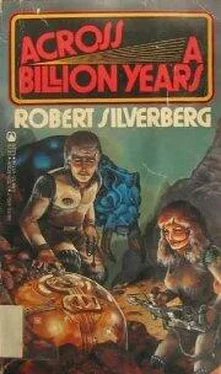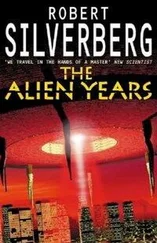The robot studied the changing hieroglyphics on the inscription node with intense interest, but confined its statements to brief, brusque commands to go on talking. By now the translating machine had absorbed a healthy chunk of data. By now it had struck me that we ought to be letting the others in on what was going on, too, and I said to Steen, “Switch to ship frequency and call Dr. Horkkk here.”
“While you feed the robot with poisonous lies?” Steen said. “You call!”
Resisting the impulse to kick Steen in the ribs, if Steen has ribs, I switched channels briefly, summoned everyone from the ship, and cut back to vocal output. The robot wanted more words… and more… and lots more. It soaked them up.
Dr. Horkkk and Pilazinool arrived, with the others not far behind. I explained the situation. Dr. Horkkk began to glow with excitement. “Keep talking,” he said.
I kept talking.
I talked myself hoarse, and then Jan took over, and after her, Saul Shahmoon. It didn’t matter much what we said; we were stocking a high-powered computer with data, in essence, and the computer would take care of sorting things out and making sense of them. Dr. Horkkk seemed to tingle in amazement and perhaps a sort of dismay, for such a sense-from-noise machine was exactly what he had been trying without success to develop in his whole career.
After more than an hour the robot was satisfied.
“No more words,” it said. “The rest will fit in by themselves.”
Translation: the machine now was sufficiently stocked with Anglic words. It would arrange them, make them accessible to the robot, and deal with additions to its vocabulary by interpreting them in context as they came along.
The robot was silent for perhaps five minutes, studying the ebb and flow of hieroglyphics on the inscription node. We didn’t dare speak.
Then it said, in fluent Anglic that reproduced my own accent and pronunciation and even tone of voice, “I will name myself for you. I can be called Dihn Ruuu. I am a machine produced to serve the Mirt Korp Ahm, whom you call the High Ones. The meaning of my name is Machine To Serve. My purpose is to remain in readiness so that I may serve the Mirt Korp Ahm if they come back to this solar system.”
Another long silence. Dihn Ruuu seemed to be waiting for questions.
Pilazinool said, “How long has it been since the Mirt Korp Ahm were on this place?”
“How shall I say the time?” the robot asked.
“That’s a tough one,” Pilazinool muttered. “We haven’t defined our units.”
Dr. Horkkk took over, and I must say he performed brilliantly. “Our basic unit is the second,” he said. “The sound I will make is one second in length.” He flashed an order back to the ship’s computer, which obligingly generated a tone lasting one second. Then he explained how the Earth-standard time units are built up, sixty seconds to a minute, sixty minutes to an hour, and so on up to a year. The robot, obedient machine that it was, refrained from making sarcastic comments about this inexact and arbitrary system that we have compelled all other races to adopt, at least in their dealings with us. (Why sixty seconds to a minute? Why twenty-four hours to a day? Why not a sensible system built on tens, or logarithms, or something orderly? Ask the Babylonians. I think they invented it.)
When the robot had grasped our time system, Dr. Horkkk moved on to our distance system, blocking out a line one centimeter in length on the vault floor, and then a one-meter line, and finally instructing the robot to visualize a kilometer as a thousand meters. Finally Dr. Horkkk proceeded to define the orbital velocity of this asteroid in terms of kilometers per hour. The robot stepped out of the vault and scanned the heavens for about half a minute, probably measuring parallax effects so it could see for itself how fast the asteroid was traveling through this solar system. Whatever fantastic computing machine is under its skull was quickly able to calculate the orbital velocity of the asteroid in terms of High Ones units of time and distance, and to work out a correlation from that to Earth-standard figures.
The robot said, “I will confirm. The orbital period of this asteroid is one year, six months, five days, three hours, two minutes, and forty-one seconds.”
“That’s right,” said Captain Ludwig.
“Very well,” Dr. Horkkk said briskly, as though it were not at all a miracle that this alien machine could learn so fast and that it could calculate orbital periods by a mere glance at the sky. “Now we may proceed. Can you give us an estimate in our terms of the time elapsed since the most recent visit of the Mirt Korp Ahm to this asteroid?”
Again the robot studied the sky — this time, apparently, scanning the stars and measuring the shifts in constellations that had taken place since its last look at the outside world.
Shortly the robot said, “941,285,008 years, two months, twelve days—”
It was like a high-voltage jolt to hear those calm words. The robot confirmed, to superhuman exactness, the calculations of Luna City Observatory. I don’t know how many computers Luna City put on that job, or how long they spent at it, but they certainly didn’t hand out an instant real-time reply the way Dihn Ruuu had just done. Something like that tends to puncture your pride in human attainments. How much superior to us the High Ones must have been, if they could build a robot that would wait patiently in a cave for 941 million years, still be in prime working order when visitors come, and be capable of tossing off computations of that sort! Zit!
“When was the last time you had contact with the Mirt Korp Ahm?” Pilazinool asked.
“941,285,008 years, two months, twelve—”
“That is, not since the sealing of the vault?”
“Correct. It is my task to await their return.”
“They won’t return,” said Pilazinool. “They haven’t been seen in this galaxy for millions of years.”
“This is contrary to possibility,” Dihn Ruuu replied smoothly. “Their existence could not have ceased. Therefore they must continue to occupy substantial portions of this galaxy. And thus they will return to this place. I must await them.”
Dr. Schein cut in, “Do you understand what I mean when I refer to the home world of the Mirt Korp Ahm?”
“The world on which their first evolution occurred,” said the robot. “The world which is basic to their history.”
“That’s it, yes.” Dr. Schein leaned forward eagerly. “We’ve tried to discover this world, but we’ve had no success. Can you give us information about it? For example: is it located in this galactic cluster?”
“Yes,” the robot said.
Dr. Schein looked distressed. He belonged to the school of thought that says the High Ones came from another galaxy. Dr. Horkkk hopped about in triumph. He was one of the first to argue that the High Ones originated right here.
Though shaken, Dr. Schein went on, “Is the star that is the sun of the Mirt Korp Ahm’s home world visible from this place?”
“Yes,” the robot said.
“I mean, is it still visible, after all the time that’s passed since you came here?”
“Yes,” the robot said.
“Will you point it out for us?” Dr. Schein asked.
I found myself trembling. The others were equally tense. This weird and dreamlike interview with an age-old machine had suddenly erupted into something of incredible importance. Passionate scientific controversies were being settled. The machine would tell us everything. All we had to do was ask! And now it was going to give us the fundamental solution to our quest — the location of the home world of the High Ones.
It stepped out of the vault again for a clear view of the heavens. It looked up.
Читать дальше












